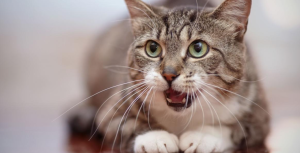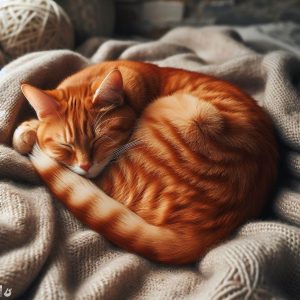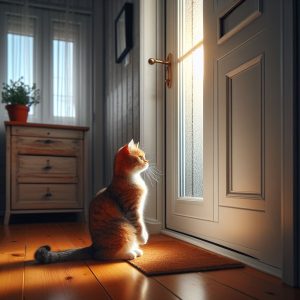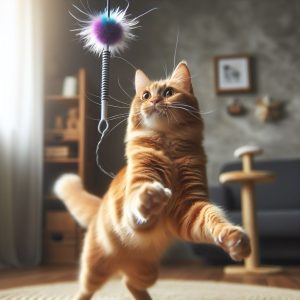As caring cat owners, we all know that cats can exhibit some seriously quirky behaviors. But few are as perplexing as when cats make odd huffing or sighing noises. If your furry friend is prone to these strange vocalizations, you’ve likely wondered “Why does my cat huff?“
Deciphering the complex reasons behind cat huffing requires some feline psychology expertise. By understanding the various causes and contextual clues, you can get to the bottom of this peculiar phenomenon.
This comprehensive guide will explore the top theories behind cat huffing and equip you to unravel the mystery. With the right insights, you can understand what your cat is trying to say when they sound off with those attention-grabbing huffs.
What Exactly is Cat Huffing?
Cat huffing refers to when cats make an exaggerated exhaling sound, much like a combination of a sigh and a huff. It manifests as an audible, forced expulsion of air from their mouth and nose.
These huffs range from very soft to quite loud and snort-like. The sound itself varies from a subtle “heh” to a more emphatic “eh-eh” or “eh-mph.” It falls somewhere between a meow, purr, hiss, or growl on the feline vocalization spectrum.
Cat huffing differs from normal breathing in that it is voluntary, louder, and reflects an emotional response or communication signal. Cats will intentionally huff to convey a feeling or make their needs known, much like meowing.
This quirky huffing behavior is remarkably common in domestic cats of all breeds, ages, and sexes. While the sound itself can seem odd or unexpected, it generally carries important behavioral meaning.
Common Triggers and Theories Behind Cat Huffing
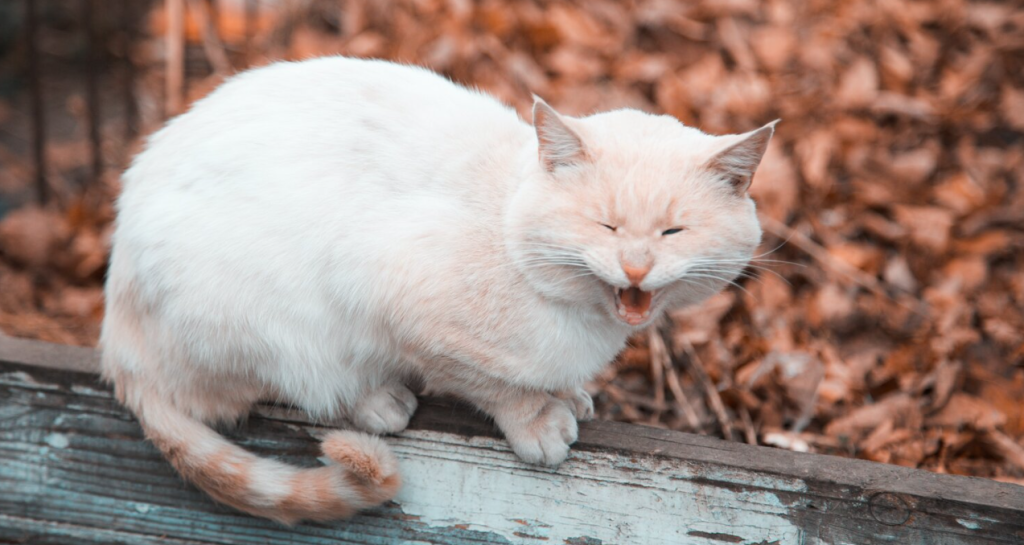
So why do cats huff in the first place? There are a number of theories behind the causes of cat huffing. By understanding what typically triggers this vocalization, you gain insight into what your own cat is trying to communicate.
Here are the 7 most common triggers known to spur cat huffing:
1. Displeasure, Annoyance, or Frustration
One of the most frequent reasons for cat huffing is displeasure, annoyance, or frustration. Cats are known to huff when interrupted during resting or playtime, as a sign of their irritation with the disruption.
Your cat may also huff out of frustration if they cannot access something they want, like food or a room. The huff communicates their dissatisfaction with the situation at hand. Think of it as your cat blowing a raspberry and saying “Hey, I’m not happy about this!“
2. Attention-Seeking Behavior
Bored, under-stimulated, or attention-seeking cats often huff to signal their need for activity and affection. This frequently occurs after their owner has been away, preoccupied, or not engaging enough with their cat.
The attention-seeking huff acts as a reminder that they require mental stimulation, playtime, and social interaction. It’s your cat’s way of saying “I’m lonely – let’s hang out!”
3. Territorial Behavior Between Cats
Huffing arises as a feline signal of territorial dominance and ownership between cats. In multi-cat households, one cat may huff at another that encroaches on their space, food bowl, bed, or litter box.
This territorial “mind your own space” huff serves as a warning rather than outright aggression. It allows cats to establish boundaries and claim preferred domains without a fight.
4. Fear, Anxiety, or Feeling Threatened
Don’t be surprised if your normally timid cat lets out a huff when they feel afraid or unsafe. This knee-jerk vocalization reflects a cat’s innate reaction to feeling threatened.
Potential fear triggers include loud noises, unfamiliar visitors, other animals, or even strange objects in their environment. The huff conveys “I’m scared – keep your distance!” as an instinctual protective response.
5. Physical Discomfort, Pain, or Illness
Cats experiencing pain or illness frequently vocalize with growling, yowling – and also huffing. Sudden, recurrent, or context-less huffing can signal an underlying medical issue requiring attention.
Pay close attention to huffing when petting sore spots, during movements, or in conjunction with changes in appetite, litter box habits, or activity levels. If in pain, the huff says “Ouch – something is wrong!”
6. Affectionate Greeting Huff
While less common, some cats do engage in happy, affectionate huffing as a form of greeting. When you return after an absence, they emit a soft “hello” huff to express their delight at your arrival.
This warm huff reflects the cat’s bond with its human companion. Similar to a meow, purr, or head rub greeting, it relays a fond “welcome back, I missed you!” message.
7. Content and Relaxed State
Lastly, cats may huff when in a calm, content state of being such as when napping, relaxing in the sun, or receiving pleasing scratches. These cozy huffs indicate your cat is perfectly relaxed and sublimely comfortable.
The soft, mellow tone signals “Ahh, this feels great – I’m so content” – similar to the meaning of a human sigh of happiness. For sensitive cats, even gentle petting can induce relaxed huffing.
Now that you know the range of motivations, you can start piecing together why your cat is huffing in a given scenario. But to fully interpret the meaning, you need to understand your cat’s unique language style.
Distinguishing Between Positive and Negative Cat Huffing
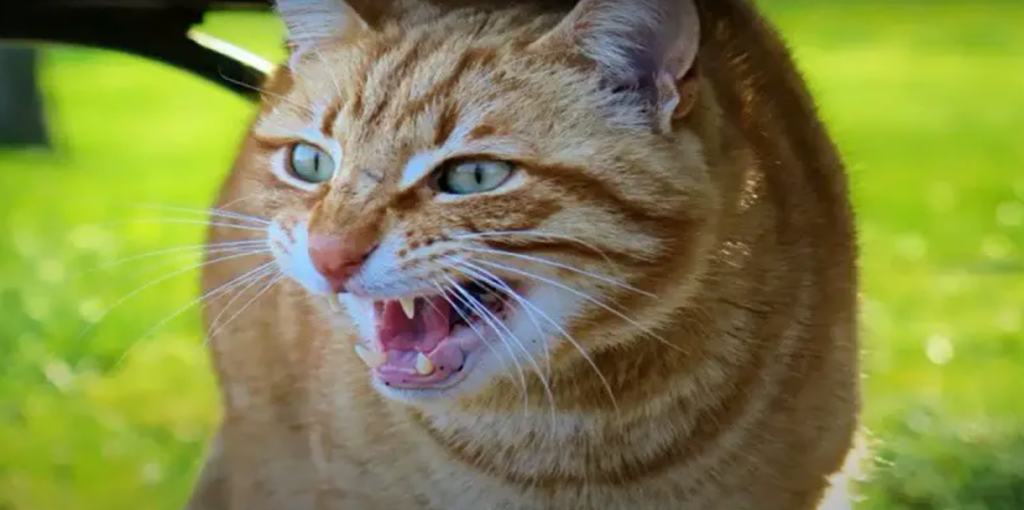
Cats huff for a variety of reasons, both positive and negative. Therefore, the context and specific nature of the vocalization provides crucial clues to whether it conveys happiness, annoyance, or other emotions.
Here’s how to decode the subtle signals:
- Listen for tone – Soft, breathy huffing indicates contentment. Louder or harsher huffing suggests displeasure or territorial behavior.
- Note body language – Relaxed posture means happy huffing. Flattened ears back, tensing up, or an aggressive stance conveys irritation.
- Consider triggers – What occurred right before the huff? Was it an unfamiliar noise or visitor, scary object, blocked access to food or a room? These hints point to fear, frustration or territoriality as the underlying cause.
- Differentiate environments – Does your cat only huff in certain settings? Trouble spots reveal sources of stress or discomfort worth addressing.
Being highly observant will enable you to correctly interpret the meaning of your cat’s huffs. With time, you’ll come to intuitively understand your unique cat’s language style.
Next, let’s explore how to respond appropriately to your cat’s huffing in different situations.
What to Do When Your Cat is Huffing: Key Takeaways
When your feline voice suddenly pipes up with “eh-eh” huffs, refer to these tips on interpreting the cause and addressing their needs:
- If your cat is huffing due to fear or pain, comfort them immediately and remove the stressor. Provide calming pheromones, treats, and affection to soothe their anxiety. Seek medical attention if discomfort seems acute.
- For attention-seeking behavior, redirect their energy through interactive playtime, engagement with toys and puzzles, or clicker training. Increase stimulation to curb boredom.
- With territorial huffing between cats, adjust resource distribution across space. Ensure each cat has plentiful, separated food, water, scratching posts, beds and litter boxes.
- If environmental frustration causes huffing, identify triggers like noise, clutter, or changes in routine. Mitigate stressors and make positive adjustments to their care.
- When huffing signals contentment, reward your happy kitty with affection! Give them head scratches, treats, and cuddles to nurture your bond.
Understanding the meaning behind your cat’s huffing allows you to address their needs for comfort, medical care, enrichment, territory, and reassurance. Soon your chatty kitty will purr instead of puff!
In-Depth FAQs About Cat Huffing:
Still mystified by your cat’s funny huffing? Here are answers to some of the most frequently asked questions:
Why does my cat huff at night?
Nocturnal huffing often relates to boredom and inactivity during evening hours. Cats naturally get more active at night but have sleepy humans and dark, quiet homes offering little stimulation.
The attention-seeking night huffs serve to alert you “Hey, I’m awake and want to play!” Engage their instincts by introducing evening play sessions, cat TV entertainment, food puzzles, and cuddle time before bed.
Is huffing and sighing a sign of pain or illness in cats?
It can be, yes. Any sudden increase in vocalizing including huffing may indicate discomfort, particularly in conjunction with changes in appetite, litter habits, activity levels, or other concerning symptoms.
Unexplained huffing when touched in certain areas also warrants medical investigation. Don’t hesitate to call your vet if your cat shows these signs of distress. Cats skillfully mask symptoms, so huffing acts as an important subtle signal worth addressing promptly.
Why does my cat huff loudly when I pet her?
Loud huffing from petting often signals overstimulation or touch sensitivity. Cats can only tolerate gentle stroking for short periods before becoming irritated. Static fur, buckles, and tenderness may also make them extra sensitive.
Respect your cat’s boundaries, keep petting gentle and brief, and stick to scratching their head and chin areas. Loud huffs are their ticked-off way of saying “That’s quite enough, thank you!“
Why does my cat randomly huff at me?
For seemingly random huffing, consider contextual stressors like changes in home layout, loud noises, clutter, unfamiliar guests, outdoor sights/smells, or disruptions in care routines.
Or, your cat may simply be in a bad mood or grumpy that day! When safe exclusions are ruled out, give them space and wait for the sassy huffs to pass.
The Takeaway: Embracing Your Cat’s Quirky Huffing Communication Style
In summary, occasional cat huffing is perfectly normal and not a cause for alarm. While the sound itself seems silly, it represents your cat’s unique way of expressing their needs and emotions.
By tuning into context clues, noting accompanying body language, and identifying triggers, you can accurately interpret the meaning of your cat’s huffing. Addressing the underlying reasons will lead to a happier, healthier kitty.
Approach your cat’s huffing antics with patience and investigative curiosity. You may just come to find their huffing behavior endearing once you crack the code! With time and understanding, those perplexing feline huffs transform into a treasured part of your cat’s unique personality.
So embrace your furry friend’s quirky vocalizations, and strengthen your mutual bond in the process. When it comes to comprehending cats, a little insight goes a long way – especially when it comes to the mysterious case of the cat huff!

